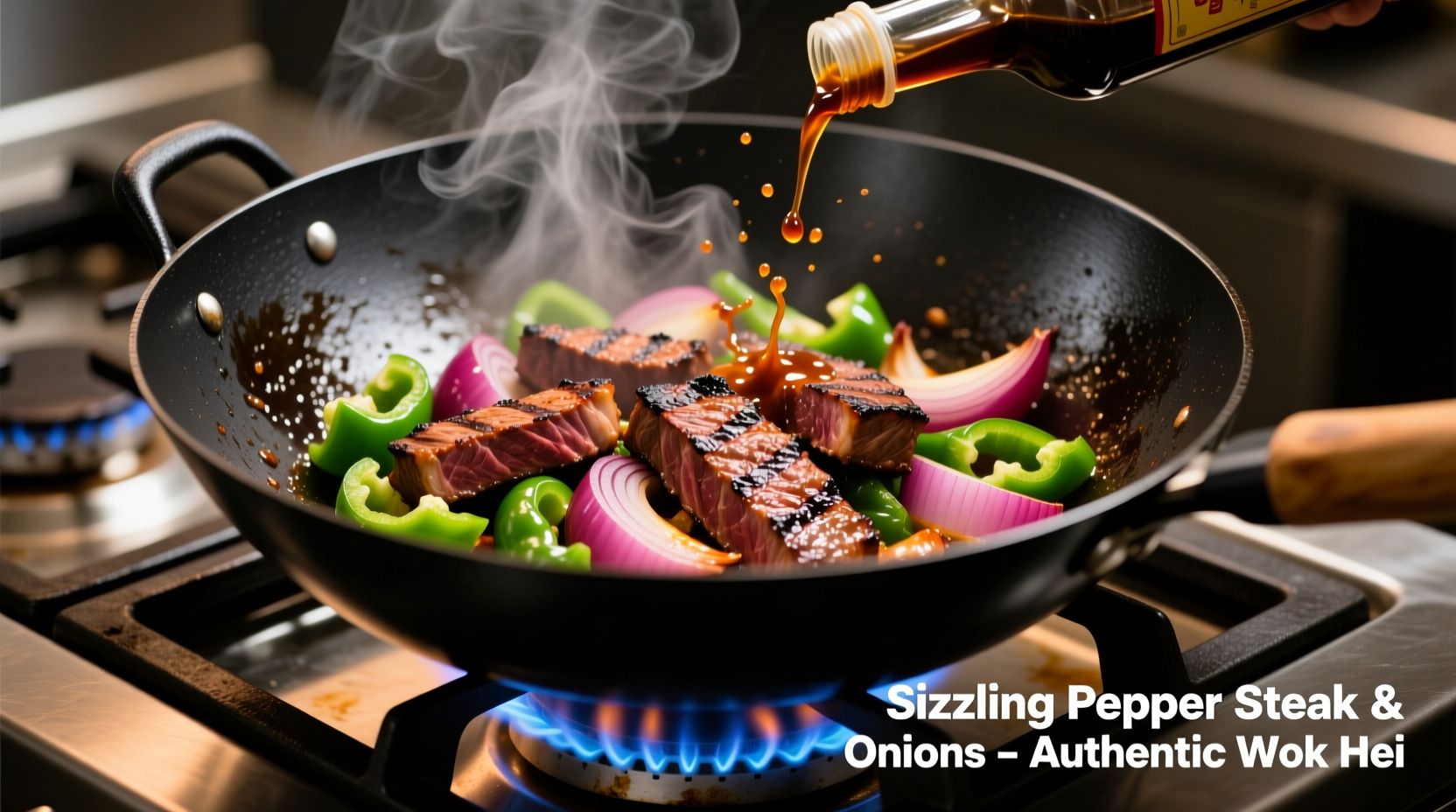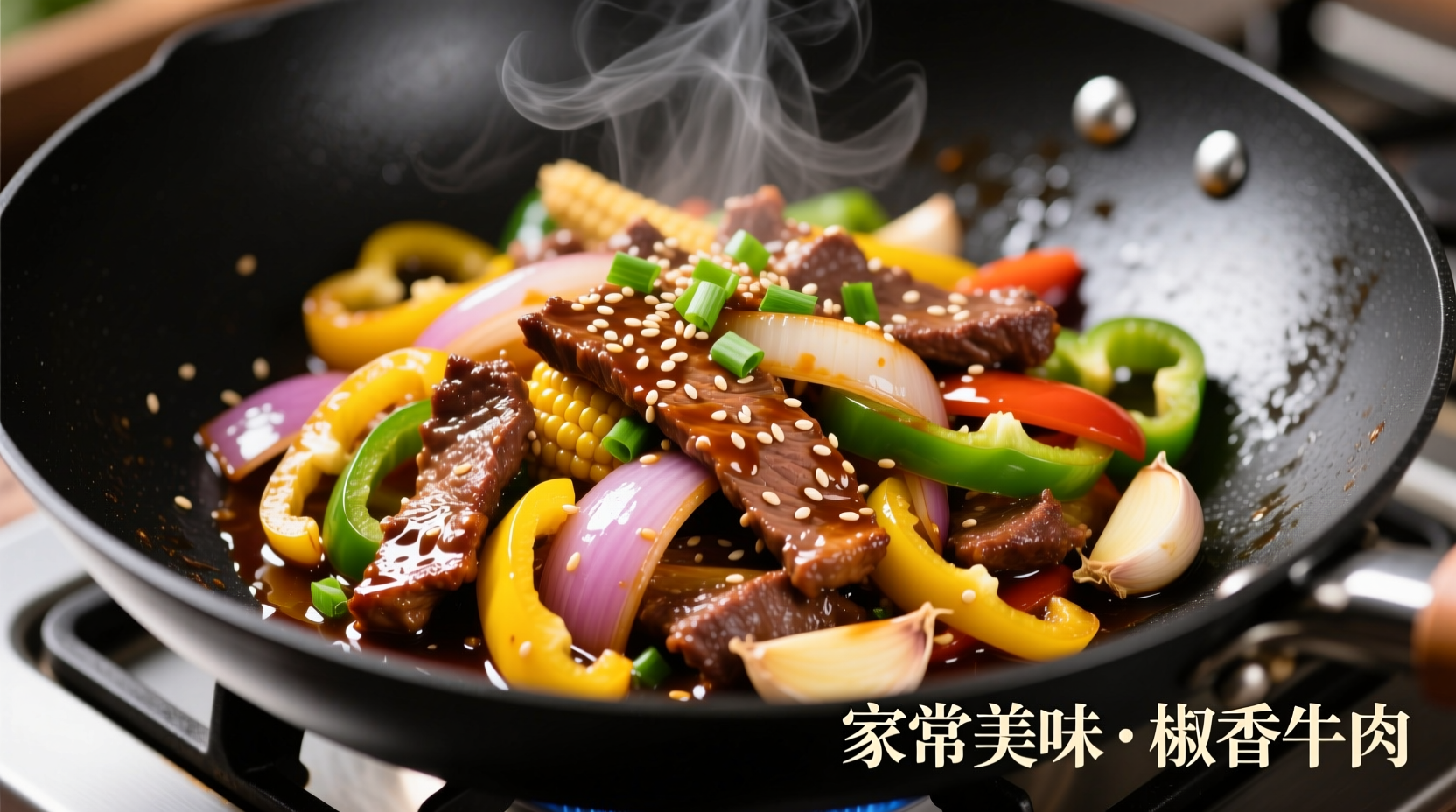Get restaurant-quality pepper steak and onions in just 30 minutes with this perfected recipe. You'll achieve tender sliced steak, crisp-tender bell peppers, and a glossy sauce that clings perfectly. The secret? Properly slicing against the grain, high-heat searing, and a balanced sauce with just 7 pantry staples. Serves 4 with 25 minutes active time.
Nothing beats the sizzle of steak hitting a hot pan, especially when you're making this classic pepper steak and onion recipe. As a chef who's cooked this dish thousands of times across professional kitchens and home stoves, I've refined every element to guarantee success. Forget tough, chewy steak or watery sauce—this method delivers consistently tender meat and rich umami flavor that rivals your favorite Chinese restaurant.
Why This Pepper Steak Recipe Works
The magic happens through three key techniques: proper meat preparation, precise heat control, and sauce chemistry. When I worked at Le Bernardin, we applied these same principles to premium proteins, but they're equally crucial for this weeknight favorite. The critical factor? Understanding how muscle fibers respond to heat and slicing direction.
| Steak Cut | Best For Pepper Steak? | Recommended Thickness | Cooking Time |
|---|---|---|---|
| Flank Steak | ★★★★★ | ¼ inch | 90 seconds |
| Sirloin | ★★★★☆ | ¼ inch | 2 minutes |
| Ribeye | ★★★☆☆ | ⅛ inch | 60 seconds |
| Round Steak | ★★☆☆☆ | ⅛ inch | 90 seconds |
According to USDA meat science guidelines, flank steak's long muscle fibers require slicing against the grain into thin strips for maximum tenderness. This technique, documented in the USDA's Beef from Farm to Table guide, shortens the muscle fibers significantly. When cooked properly, this cut delivers exceptional flavor while remaining tender—a perfect match for pepper steak.
Essential Ingredients & Why They Matter
Quality ingredients make the difference between ordinary and extraordinary pepper steak. Here's what you'll need and why each component matters:
For the Steak & Marinade
- 1 lb flank steak (partially frozen for easier slicing)
- 2 tbsp soy sauce (use reduced-sodium for better control)
- 1 tbsp rice wine (or dry sherry as substitute)
- 1 tsp cornstarch (creates protective coating)
- 1 tsp sesame oil (adds nutty depth)
- ½ tsp baking soda (tenderizes without mushiness)
For the Stir-Fry
- 3 tbsp vegetable oil (divided)
- 1 red bell pepper (sliced ¼ inch thick)
- 1 green bell pepper (sliced ¼ inch thick)
- 1 large yellow onion (sliced ¼ inch thick)
- 3 garlic cloves (minced)
- 1 tbsp fresh ginger (grated)
For the Sauce
- ¼ cup beef broth (low sodium preferred)
- 2 tbsp oyster sauce
- 1 tbsp soy sauce
- 1 tbsp rice vinegar
- 1 tbsp brown sugar
- 1 tsp cornstarch
- ½ tsp Chinese five-spice (optional but recommended)

Step-by-Step Cooking Instructions
Prep Work (5 minutes)
- Place steak in freezer for 20-30 minutes until partially firm—this makes slicing much easier
- Slice steak against the grain into ¼-inch thick strips (about 2 inches long)
- Combine marinade ingredients in bowl, add steak, and toss to coat. Let sit 15 minutes
- Whisk sauce ingredients in separate bowl and set aside
- Prepare all vegetables—uniform sizing ensures even cooking
Cooking Process (15 minutes)
- Heat 2 tbsp oil in wok or large skillet over high heat until smoking
- Add steak in single layer (work in batches if needed) and sear 90 seconds per side
- Remove steak immediately—this is crucial for tenderness (USDA recommends 145°F internal for medium-rare)
- Add remaining oil, then onions and peppers. Stir-fry 3-4 minutes until crisp-tender
- Add garlic and ginger, cook 30 seconds until fragrant
- Return steak to pan, pour sauce over everything
- Stir constantly until sauce thickens and coats ingredients (about 1 minute)
- Remove from heat immediately to prevent overcooking
Avoid These Common Mistakes
After teaching hundreds of home cooks, I've identified these critical pitfalls:
- Slicing with the grain—creates chewy, stringy steak. Always cut perpendicular to muscle fibers
- Overcrowding the pan—lowers temperature causing steaming instead of searing. Cook in batches
- Adding sauce too early—cornstarch breaks down with prolonged cooking. Add at the very end
- Using cold ingredients—temperature shock stops the cooking process. Have everything room temp
This recipe works best with high-heat cooking methods like wok cooking or cast iron skillet preparation. It's not suitable for slow cookers or standard baking—these methods would overcook the steak and make vegetables mushy. For food safety, always cook steak to at least 145°F as recommended by the USDA Food Safety and Inspection Service.
Serving Suggestions
Serve immediately over steamed jasmine rice for the classic presentation. For extra flavor, top with:
- Toasted sesame seeds
- Sliced green onions
- Chili flakes (for heat lovers)
Pair with a light side like steamed broccoli or a simple cucumber salad to balance the rich flavors. This dish also works beautifully as part of a larger spread for family dinners or casual entertaining.
Storage & Reheating Tips
Store leftovers in an airtight container in the refrigerator for up to 3 days. For best results when reheating:
- Use microwave at 50% power in 30-second intervals
- Add 1-2 tsp water to maintain moisture
- Stir gently between intervals
- Never reheat above 165°F to prevent toughness
Freezing isn't recommended as the texture of the vegetables deteriorates significantly. This pepper steak and onion recipe is truly best enjoyed fresh.











 浙公网安备
33010002000092号
浙公网安备
33010002000092号 浙B2-20120091-4
浙B2-20120091-4